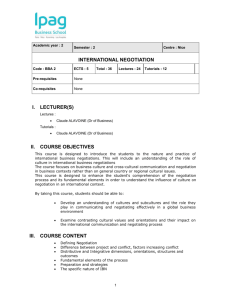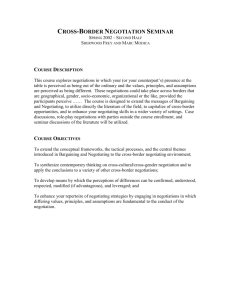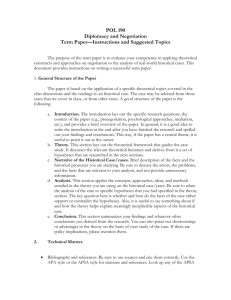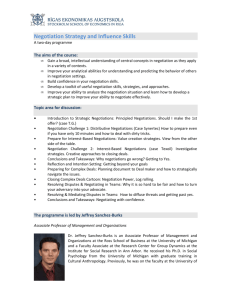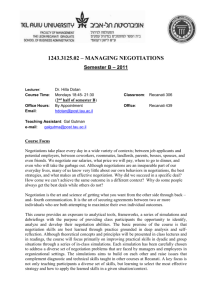MBA and M.Sc. Courses 1243.3125.02 – Managing Negotiations
advertisement
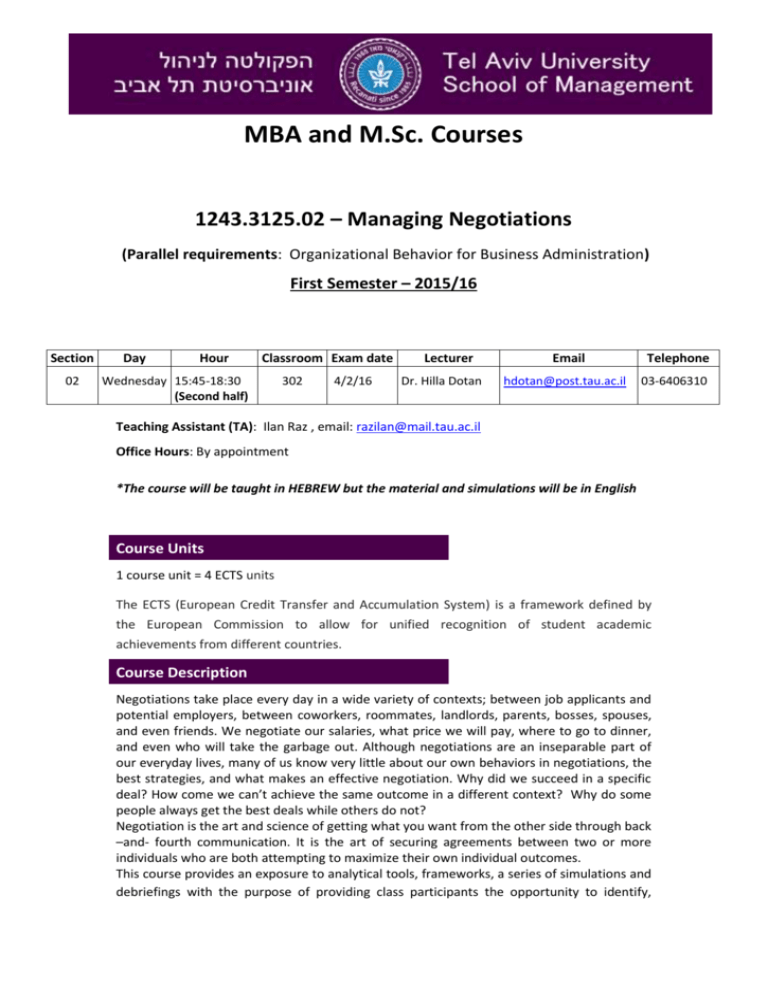
MBA and M.Sc. Courses 1243.3125.02 – Managing Negotiations (Parallel requirements: Organizational Behavior for Business Administration) First Semester – 2015/16 Section 02 Day Hour Classroom Exam date Wednesday 15:45-18:30 (Second half) 302 4/2/16 Lecturer Dr. Hilla Dotan Email hdotan@post.tau.ac.il Telephone 03-6406310 Teaching Assistant (TA): Ilan Raz , email: razilan@mail.tau.ac.il Office Hours: By appointment *The course will be taught in HEBREW but the material and simulations will be in English Course Units 1 course unit = 4 ECTS units The ECTS (European Credit Transfer and Accumulation System) is a framework defined by the European Commission to allow for unified recognition of student academic achievements from different countries. Course Description Negotiations take place every day in a wide variety of contexts; between job applicants and potential employers, between coworkers, roommates, landlords, parents, bosses, spouses, and even friends. We negotiate our salaries, what price we will pay, where to go to dinner, and even who will take the garbage out. Although negotiations are an inseparable part of our everyday lives, many of us know very little about our own behaviors in negotiations, the best strategies, and what makes an effective negotiation. Why did we succeed in a specific deal? How come we can’t achieve the same outcome in a different context? Why do some people always get the best deals while others do not? Negotiation is the art and science of getting what you want from the other side through back –and- fourth communication. It is the art of securing agreements between two or more individuals who are both attempting to maximize their own individual outcomes. This course provides an exposure to analytical tools, frameworks, a series of simulations and debriefings with the purpose of providing class participants the opportunity to identify, analyze and develop their negotiation abilities. The basic premise of the course is that negotiation skills are best learned through practice grounded in deep analysis and selfreflection. Although theoretical concepts and principles will be presented in class lectures and in readings, the course will focus primarily on improving practical skills in dyadic and group situations through a series of in-class simulations. Each simulation has been carefully chosen to address a diverse set of negotiation problems that are faced by managers and employees in organizational settings. The simulations aims to build on each other and raise issues that complement diagnostic and technical skills taught in other courses at Recanati. A key focus is not only teaching participants a diverse set of skills, but learning to select the most effective strategy and how to apply the learned skills in a given situation/context. Course Objectives The primary goal of the course is to enhance your ability as a negotiator by: Reflection and awareness of your own negotiating style Learning to develop a strategic plan prior to a negotiation Exposure to central concepts in negotiations and how to apply these Improving your ability to ‘read’ others and predicting their behavior Learning about types of negotiations and adapting different strategies for the relevant context Building an “individual customized toolkit” of useful negotiation skills, strategies and approaches *The course incorporates readings drawn from scholarly professional and business journals and books as well as in-class simulations/exercises. Evaluation of Student and Composition of Grade* Class Participation - 63% of grade The class participation grade for all simulation-based sessions will be divided into three parts (Total- 9% per session). Preparation: The first part will be determined by your preparation for the simulation. You will be assigned a role and be required to prepare a written analysis on a “preparation- form” prior to the simulation. All preparation forms will completed and handed in at every class session and will comprise 4% of your grade. You are responsible for handing in your preparation guide at every session. Feedback: The second part will be determined by your feedback to your partner/s in the simulation. After each simulation, you will be asked to provide written feedback on a “feedback/debrief form” to your partner/s. All feedback forms will also be handed in at every class session and will compromise 3% of your grade. Participation: The final component of your grade will be influenced by the quality of your participation in class discussions. This will be determined by the value of your comments, new perspectives that you raise, and application of theoretical concepts from the readings. The grade for this component will comprise 2% of your grade. Final Paper - 37% of grade The purpose of the Final Paper is to enrich your learning through analysis and reflection on your own negotiation experiences and your abilities as an effective negotiator. Moreover, in this assignment you must apply class concepts and suggest ‘improvement strategies’ that will help you improve as a negotiator. Part A: The focus of the first part of the paper is on your past negotiating experiences and your evaluation of your strengths and weaknesses as a negotiator. Part B: The focus of the second part of the paper will be on perceptions others have of you as a negotiator and analysis of a current negotiation. There should be enough description so we can understand the context, but the focus should be on analyses. (Additional guidelines about the final paper will be provided by the instructor in class.) Students who are unable to complete an assignment or course requirement must notify the TA or course instructor in advance via email Class Attendance* Given the nature of the course, students must attend ALL sessions and actively participate in class discussions and in-class simulations/exercises for maximum course benefit. Attendance is mandatory and all efforts should be made to attend every session. In case a student must miss a session or half a session he/she must inform the instructor before the missed session to avoid interruptions to sessions. In order to avoid penalty to the grade (and if the student has a reasonable excuse) he/she may request a ‘make-up’ exercise. The make-up assignment should be submitted ASAP but before the following session. A maximum of two absentees will be allowed throughout the course, however, only one make-up assignment will be possible per student. (i.e. a student who misses class for the second time will NOT be able to make up the 9% of that session). A person who misses more than two sessions will not be able to pass the course. * According to University regulations, participation in all classes of a course is mandatory (Article 5). * Students who absent themselves from classes or do not actively participate in class may be removed from the course at the discretion of the lecturer. (Students remain financially liable for the course even if they are removed.) Grading Policy In the 2008/9 academic year the Faculty instituted a grading policy for all graduate level courses that aims to maintain a certain level of the final course grade. Accordingly, the final average grade for this course (which is a core course) will be in the range 78-82%. Additional information regarding this policy can be found on the Faculty website. A weighted grade of at least 78% in this course is required to continue to specialize in Organizational Behavior. http://recanati.tau.ac.il/masters/yedion/2015-16/mba-rules-tests Evaluation of the Course by Student Following completion of the course students will participate in a teaching survey to evaluate the instructor and the course, to provide feedback for the benefit of the students, the teachers and the university. Required Course Reader and Course Site (Moodle) There is a required course reader. The reader containing all the course readings will be available prior to the start of the course at “Safrot Zola”. You must order the reader prior to the first session as you will need to prepare the material for our first simulation. Additional items and all simulation materials will be distributed in class or otherwise provided by the instructor. Course Website The course site will be the primary tool to communicate messages and material to students. You should check the course site regularly for information on classes, assignments and exams, at the end of the course as well. Course material will be available on the course site. Please note that topics that are not covered in the course material but are discussed in class are considered integral to the course and may be tested in examinations. Course Outline & Required Readings* SESSION 1 Oct 21, 2015 Lecture Topic INTRODUCTION TO NEGOTIATIONS Introduction to the course o The Art of Negotiating o “The Problem” o Separating the People from the Problem o Interests v.s Positions o Value of Agents Simulation #1: Assignment Readings SESSION 2 Oct 28, 2015 Lecture Topic Fisher, R., Ury, W., & Patton, B. 1991. Getting to Yes. New York: Penguin. (Chapters 2,3) Rubin, J., & Sander, F. “When Should We Use Agents? Direct vs. Representative Negotiation”. In Breslin, W., & Rubin, J. 1991. Negotiation Theory and Practice, Cambridge, MA: 81-87. INTEGRATIVE & DISTRIBUTIVE NEGOTIATIONS Focus: Two Party Negotiations Integrative vs Distributive Negotiations o The Mythical Fixed Pie Basic Terms: o BATNA, Reservation Price, Bargaining Zone Simulation #2: Assignment Readings Bazerman M.H., & Neale, M.A. 1992. Negotiating Rationally. The Free Press: New York, NY. (Chapters 1,3,9). Malhotra, D. & Bazerman, M. 2007. Negotiation Genius: How to Overcome Obstacles and Achieve Brilliant Results at the Bargaining Table and Beyond, Bantam Dell: New York, NY.( Chapter 1: Claiming Value) SESSION 3 Nov 4, 2015 INTRA-INTER GROUP NEGOTIATIONS Lecture Topic o Prisoner’s Dilemma o Tit-for-Tat o Team decision process o Finding Options for Mutual Gain o Escalation of Commitment Simulation #3: Assignment Readings SESSION 4 Nov 11, 2015 Lecture Topic Bazerman M.H., & Neale, M.A. 1992. Negotiating Rationally. The Free Press: New York, NY. (Chapters 2, 17). Fisher, R., Ury, W., & Patton, B. 1991. Getting to Yes. New York: Penguin. (Chapter 4) MULTI-PARTY NEGOTIATIONS Multi-issue Negotiation Value of Coalitions o Who to form a coalition with? o Trade-offs o Consensus or Majority rule? o Concept of “Anchoring and Adjustment” o “Framing” Simulation #4: Assignment Due Readings Watkins, M. and Rosegrant, S. “Sources of Power in Coalition Building,” Negotiation Journal, Jan, 1996, pp. 47-68 Bazerman M.H., & Neale, M.A. 1992. Negotiating Rationally. The Free Press: New York, NY. (Chapters 4,5). SESSION 5 ORGANIZATIONAL NEGOTIATIONS Nov 18, 2015 Lecture Topic Long Term/Short Term Negotiations Trusting in Negotiations o Who To Trust? o How to Build Trust in a Negotiation? Third Party Involvement: o Mediation, Arbitration, Law Suit, ADR Simulation #5: Assignment Readings SESSION 6 Nov 25, 2015 Lecture Topic Malhotra, D. & Bazerman, M. 2007. Negotiation Genius: How to Overcome Obstacles and Achieve Brilliant Results at the Bargaining Table and Beyond, Bantam Dell: New York, NY (Chapter 9) Malhotra, D. “Risky Business: Trust in Negotiations,” Negotiation, Vol. 7, No. 2, Feb. 2004 CROSS-CULTURAL NEGOTIATIONS Culture and Negotiation Why Are Global Negotiations Different? Key challenges and Preparation Tips when Negotiating with : o Asia, Europe, and the USA Simulation #6: Assignment Due Readings Acuff, F.L. 2008. How to Negotiate Anything with Anyone Anywhere Around the World. AMACOM: New York, NY. (Chapter 2, 8, 10) Brett, J.M. 2007. Negotiating Globally: How to Negotiate Deals, Resolve Disputes and Make Decisions across Cultural Boundaries. Jossey-Bass: San Francisco: CA. (Chapter 2 & 7) SESSION 7 Dec 1, 2015 CONCLUDING SESSION: BECOMING A BETTER NEGOTIATOR Lecture Topic Negotiating from a weakness Maintaining Relationships after a Conflict or Negotiation Breakdown Course Overview Simulation #7: Assignment Due Readings Final Paper: Evaluation of a Real Negotiation & Others' Reflections on You as a Negotiator *Subject to change Malhotra, D. & Bazerman, M. 2007. Negotiation Genius: How to Overcome Obstacles and Achieve Brilliant Results at the Bargaining Table and Beyond, Bantam Dell: New York, NY. (Chapter 11) Optional: Malhotra, D., Ku, G, and Murninghan, J.K. “When Winning is Everything,” Harvard Business Review, Vol. 86 No. 5, May 2008

